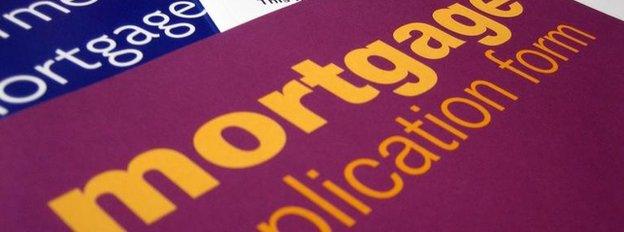New mortgage rules and you
- Published

There are nearly 10 million outstanding mortgages in the UK
A mortgage is usually the biggest debt that people face during their lives. Now the rules governing who can secure a home loan are tightening.
The new system, which comes into force fully on 26 April, ensures that lenders conduct a full affordability check on mortgage applicants.
This will have practical implications for the amount people can borrow and the length of time that an application might take.
The aim is to prevent any return of the pre-crisis mortgage lending that many described as "reckless".

Remind me what the problem was?
Before the financial crisis, the housing market was booming, sales were frequent, and lenders were keen to advance individuals a mortgage.
In some well-documented cases, potential buyers were able to borrow the full price of a home, and a loan on top, then initially just pay back the interest.
But, when property prices fell, many found themselves in negative equity. Many who lost their jobs or had hours reduced also found they had overextended themselves when borrowing for a mortgage and struggled to make repayments.
The City regulator, the Financial Conduct Authority (FCA), is introducing new regulations to ensure the most extreme cases are not repeated.
"In the past too many people got a mortgage by simply telling their lender they would have no problem repaying their debt, and that was that," said Martin Wheatley, chief executive of the FCA.
"Our new rules will hardwire common sense into mortgage lending."

That sounds sensible. So what is the counter-argument?

There are concerns about the implementation. A stricter interview could mean lenders ask more delving questions about an applicant's lifestyle and the whole process could take longer. That could extend the amount of time it takes to move home.
Some people could find that they might have been able to get a mortgage previously, but now discover that the lender is only prepared to offer a smaller amount, or may reject the application completely.
This will not only affect first-time buyers, but also those looking to remortgage.
One reason for this is that a lender has to "stress test" a customer's ability to repay if interest rates were to rise.

How is potential difficulty calculated?
The Bank rate is at a record low at the moment, so mortgage rates have also been low for some time.
A lender, who might be offering a mortgage with an interest rate of less than 4% now, will have to decide whether an applicant would be able to make regular repayments if the rate rose to something like 7%.
In order to decide, the lender will not only take account of income, but of outgoings too.

What questions could I be asked when I apply?

The lender is interested in how much money is spare in a borrower's personal budget. So any regular payments could be asked about in the application process.
This could range from the cost of regular haircuts, gambling and club subscriptions and deliveries, to holidays, travel season tickets and childcare.
Borrowers will also be expected to say if their financial position is expected to change. That could include any predicted changes in income or working hours, but might also include any plans to have children in the near future.
Many lenders have already implemented the new rules, so borrowers might recognise some of these questions already. The Council of Mortgage Lenders says the transition to the new rules will be "smooth".

What suggestions are being made to applicants?

Brokers say it will be important to have a household budget clearly worked out before starting the application process.
They say that lenders are likely to ask for a number of documents that prove income and outgoings figures, such as payslips and bank statements. They say it is important to send all these documents together in one go when they are requested, otherwise the process could be delayed further.
Some also suggest "cleaning up" a household budget. So cancelling an unused gym subscription could be a good idea before making a mortgage application.

How much do people usually borrow?
There are nearly 10 million mortgages in existence in the UK, according to the FCA, with more than £1 trillion owed.
The typical first-time buyer borrows £137,000, with those remortgaging borrowing an average of £144,500.
Under the new rules, it will be the lenders, not the borrowers, who are checked by the regulator to ensure affordability checks for mortgage repayments are being carried out properly.